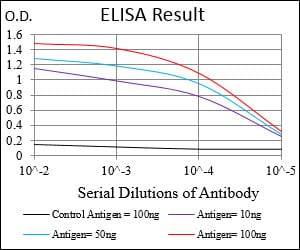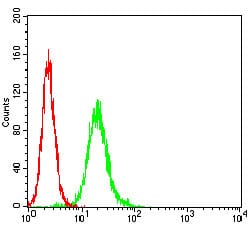

| WB | 咨询技术 | Human,Mouse,Rat |
| IF | 咨询技术 | Human,Mouse,Rat |
| IHC | 咨询技术 | Human,Mouse,Rat |
| ICC | 技术咨询 | Human,Mouse,Rat |
| FCM | 1/200 - 1/400 | Human,Mouse,Rat |
| Elisa | 1/10000 | Human,Mouse,Rat |
| Aliases | AAA; AD1; PN2; ABPP; APPI; CVAP; ABETA; PN-II; CTFgamma |
| Entrez GeneID | 351 |
| clone | 5H10A10 |
| WB Predicted band size | 87kDa |
| Host/Isotype | Mouse IgG2b |
| Antibody Type | Primary antibody |
| Storage | Store at 4°C short term. Aliquot and store at -20°C long term. Avoid freeze/thaw cycles. |
| Species Reactivity | Human |
| Immunogen | Purified recombinant fragment of human APP (AA: 483-699) expressed in E. Coli. |
| Formulation | Purified antibody in PBS with 0.05% sodium azide. |
+ +
以下是关于APP抗体的3篇代表性文献示例(注:内容为概括性描述,实际文献请通过学术数据库检索获取):
1. **文献名称**:*Amyloid precursor protein processing and Alzheimer's disease*
**作者**:Selkoe DJ, et al.
**摘要**:探讨了APP蛋白在阿尔茨海默病中的代谢途径,重点分析β-分泌酶和γ-分泌酶对APP的切割作用,以及产生的Aβ肽段在病理沉积中的作用,提出针对APP加工过程的抗体在疾病诊断中的潜在价值。
2. **文献名称**:*The role of APP-specific antibodies in detecting early-stage Alzheimer's biomarkers*
**作者**:Hardy J, et al.
**摘要**:研究开发了高特异性APP抗体,用于检测脑脊液和血液中的APP衍生片段(如sAPPα/sAPPβ),验证其作为阿尔茨海默病早期生物标志物的可行性,并比较了不同抗体对病理Aβ寡聚体的识别能力。
3. **文献名称**:*Monoclonal antibodies targeting amyloid precursor protein: Therapeutic implications*
**作者**:Haass C, et al.
**摘要**:评估了靶向APP不同表位的单克隆抗体在转基因小鼠模型中的治疗效果,发现部分抗体可减少Aβ斑块形成并改善认知功能,同时讨论了抗体可能引发的副作用(如神经炎症风险)。
**建议**:可通过PubMed、Google Scholar等平台搜索关键词“APP antibody”“amyloid precursor protein therapeutics”或结合具体研究方向(如“diagnosis”“biomarker”)获取最新文献。
APP (amyloid precursor protein) is a transmembrane glycoprotein widely expressed in the brain and other tissues, best known for its role in Alzheimer’s disease (AD) pathology. Under physiological conditions, APP contributes to synaptic formation, neuronal adhesion, and intracellular signaling. However, aberrant proteolytic processing of APP by β- and γ-secretases generates amyloid-beta (Aβ) peptides, which aggregate into neurotoxic plaques—a hallmark of AD. Antibodies targeting APP or its fragments are critical tools in studying its metabolism and disease mechanisms.
Anti-APP antibodies often recognize specific epitopes, such as the N-terminal, C-terminal, or Aβ domain. For example, antibodies like 6E10 and 4G8 bind to Aβ sequences, aiding in detecting soluble Aβ or plaque deposits in brain tissues. Others target non-amyloidogenic regions to distinguish full-length APP from its cleavage products (e.g., sAPPα or sAPPβ). These antibodies are pivotal in techniques like Western blot, immunohistochemistry, and ELISA to explore APP processing dynamics in cellular or animal models.
Additionally, therapeutic anti-Aβ monoclonal antibodies (e.g., aducanumab, lecanemab) have been developed to clear Aβ aggregates, reflecting APP’s central role in AD drug development. Research on APP antibodies continues to advance biomarker discovery and therapeutic strategies, though challenges remain in specificity and cross-reactivity across APP isoforms.
×